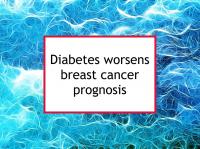Type 2 diabetes ("diabetes") is a well-established risk factor for breast cancer and its progression. High circulating glucose and insulin resistance both increase the risk. While obesity, another breast cancer risk factor, is often present with diabetes, it does not fully explain the association. Now a new study has reported fresh evidence regarding the causal effect of diabetes in breast cancer mortality.
Those with type 2 diabetes can improve their outcomes
Although multiple studies have reached the conclusion that type 2 diabetes is associated with worse survival, there is also evidence that those with the disease can take steps to counteract this effect:
- Keep blood sugar under tight control, avoiding spikes. High blood sugar has been shown to increase breast cancer risk even in lean women without diabetes. It is possible to have an A1C below 7% while still having an unfavorable dietary pattern — for example, by fasting most of the day (which lowers blood sugar) and then having one large meal late in the day (which can increase blood sugar dramatically in some diabetics).
- Adopt a diabetes risk reduction diet, while at the same time making anti-breast cancer food choices (see How to optimize your breast cancer diet).
- Consider asking your endocrinologist whether it makes sense to include metformin as part of your diabetes treatment regimen if it is not already so. In addition to increasing insulin sensitivity, metformin has been shown to reduce cell proliferation and is associated with better survival outcomes in women with type 2 diabetes. However, note that metformin-induced lactic acidosis has been reported to impair response of cancer cells towards paclitaxel and doxorubicin.
- Continue to use low-dose aspirin if it has been prescribed and you can tolerate any potentially harmful side effects. Low-dose aspirin use is also associated with improved survival in diabetic breast cancer patients.
Latest research explains how diabetes promotes breast cancer
The study referenced above was designed to analyze the association of diabetes with breast cancer mortality in 3,386 breast cancer patients. Up to one third of breast cancer patients also have diabetes. Although observational studies have reported an association between type 2 diabetes and breast cancer risk, whether there is a causal relationship between diabetes and breast cancer prognosis has remained unclear. Similarly, the molecular mechanisms underlying breast cancer-diabetes interactions have not been clearly elucidated.
To conduct the analysis, the authors used four different causal inference methods (g-computation, inverse probability of treatment weighting, targeted maximum likelihood estimation, and TMLE-super learner). This resulted in significant adjusted odds ratios for five-year mortality in diabetic breast cancer patients of 1.926, 2.268, 1.917, and 2.113, respectively. In other words, each method produced results consist with diabetes being a cause of increased beast cancer mortality.
Further analyses established that FIBCD1 (Fibrinogen C domain-containing protein 1) was highly expressed in the breast tumor tissues of diabetics and also in breast cancer cells under high-sugar conditions. FIBCD1 is an immune protein with a variety of functions. Upregulation of FIBCD1 was found to promote proliferation, migration, and invasion of breast cancer cells in a glucose-dependent manner. In addition, knockdown of FIBCD1 (silencing the expression of the FIBCD1 gene) was found to suppress breast cancer tumor growth in diabetic mice. These findings support the conclusion that FIBCD1 is an important driver of breast cancer in the presence of diabetes.
The authors further established that MCM5 was a target of FIBCD1. MCM5 is a cell pathway gene with important roles in cell cycle regulation and DNA replication. Hyperglycemia upregulated the expression of FIBCD1, which in turn activated MCM5 expression, affecting cell cycle and proliferation. The authors conclude that their results represent new evidence that the presence of diabetes has a causal effect on overall mortality in breast cancer patients. In addition, the research suggests that FIBCD1 is an oncogene in diabetic breast cancer. Therefore, targeting FIBCD1 might be a promising treatment for breast cancer among diabetics, according to the authors.
Please see our articles on type 2 diabetes and aspirin for more information.
